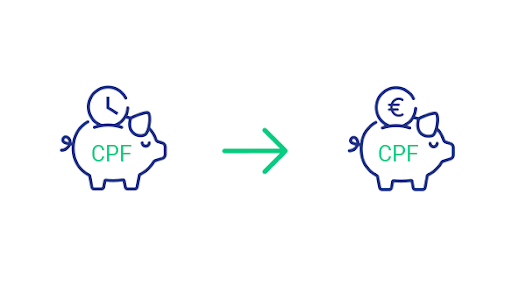“Nine hundred euros?” I was stunned. The admin person for a French school in Paris had just called me back and told me that was the budget I had to spend on French classes. I had spent a couple weeks sending some paperwork, stopping by their office to do an assessment, and just waiting. It turns out that part of my social contributions as a small business owner in France goes into a fund which is then augmented by the government should I choose to use them.
I hadn’t made anywhere near to 900 euros of contributions into this particular fund, but the government said I was entitled to that much. Great!
As an aside, this sort of program and goofy math necessarily anticipates most people not taking advantage of this benefit.
For all the talk about the benefits the French have, many of them – like this one – go unused. Oh well, that’s not my problem. I’m not usually going to pass up “free money” if the conditions attached are not onerous.
I had spent years seeing the humorous ads for Wall Street English in the Metro. This is a well-established international company that teaches English and has an enormous office at Republique. In the fine print at the bottom of the ads it always notes in French that these classes are eligible for reimbursement via CPF.
What is CPF?

This is a social program which stands for Compte Personnel de Formation. Its overarching goal is to provide people with opportunities to train and study throughout their working life in France. You earn credits for your CPF via your job. It’s tied to you personally, not to your employer.
It’s available to private sector employees, the unemployed, and young people who are just entering the workforce. You can use it to train for another career: for example, you could take coding classes, hoping to leave your current career for a new one as a programmer. Or maybe you’re happy in your current job and you use the funds to take Japanese classes because you want to. The amount of money available to you depends on the type of courses you are taking and whether those courses are considered “priority” or “non-priority.”
I had stupidly assumed that CPF was only for salarie types, never thinking that of course entrepreneurs would have their own corresponding scheme. Such a scheme has existed since 1993, and it’s called FIFPL.

FIFPL
This stands for Fonds Interprofessionel de Formation des Professionnels Liberaux. It’s essentially CPF but for us Prof Lib types. I suppose I could use the funds for other classes, but I have no interest in coding (or Japanese, or anything else at the moment). I decided to use the money for more French classes to progress to B1 and beyond.
The company I used in 2019 charged only 35 euro per hour for private lessons in my home. I wasn’t entirely happy with them so I am looking to spend my 2020 funds elsewhere, but the point is, these are “use or lose” funds so make sure you use them this calendar year. I’m chagrined that I never used the 2016, 2017, or 2018 funds that I was entitled to (and had made a small contribution towards).
How to get your “free money”
- go to URSSAF’s website to get your attestation. After you log in at Urssaf, go to the “attestations” menu and download the “Attestation de Contribution à la formation professionnelle.” This form and its numbers won’t really mean anything to you, but the school you select will use this information to find out how much of a budget you are entitled to.
- pick a school that accepts FIFPL money and email them this attestation along with the courses you are interested in and register on the FIFPL website or ask the school to help you establish an account. Then agree on a course of studies with the school. Pay for the course upfront (for example, if the course costs 559 euros and 500 euros is what has been allocated for you then you are only out of pocket 59 euros.
- complete the course, receive a certificate of completion from the school, and send it to FIFPL
- get reimbursed a couple weeks later.
Some years ago I wrote about the unbelievable work benefits that salaried workers in France have access to. Turns out we small business owners have a few of our own. 🙂

About the author:
Singaporean-born American Stephen Heiner has been living in Paris since 2013, what he hopes to be a permanent home after living in Asia and the United States for most of his life. While he has an undergraduate degree in literature, he also has an MBA, and he’s very much the man who enjoys studying financial statements as much as he enjoys reading essays by G.K. Chesterton or James Howard Kuntsler.
He visits his family in the U.S. and Singapore each year, but in the meantime enjoys his dream city, which he finally had a chance to move to after selling a company he built over a number of years.
You can find him on twitter and instagram @stephenheiner.
You can also follow his immigration journey on www.theamericaninparis.com, where Stephen also offers consulting to those interested in relocating to, and/or making a life in, France.
See more of Stephen’s posts on Dispatches here.














